Jane Weaver on being inspired by Spiritualist art, slut-dropping onstage, and why the music industry is still sexist
As she prepares to go on tour, she discusses her acclaimed new space rock album Modern Kosmology

Your support helps us to tell the story
From reproductive rights to climate change to Big Tech, The Independent is on the ground when the story is developing. Whether it's investigating the financials of Elon Musk's pro-Trump PAC or producing our latest documentary, 'The A Word', which shines a light on the American women fighting for reproductive rights, we know how important it is to parse out the facts from the messaging.
At such a critical moment in US history, we need reporters on the ground. Your donation allows us to keep sending journalists to speak to both sides of the story.
The Independent is trusted by Americans across the entire political spectrum. And unlike many other quality news outlets, we choose not to lock Americans out of our reporting and analysis with paywalls. We believe quality journalism should be available to everyone, paid for by those who can afford it.
Your support makes all the difference.“Some songs arrive like little vignettes, little scenes. Or I get a full orchestra of a song in my head. How do things come to us: are they just in the air?” Jane Weaver – writer, musician, singer and producer of gloriously spacey psych-rock – is musing about the muse with just the sort of ethereal wonder you might expect from someone whose new album is called Modern Kosmology, and was inspired by Spiritualist avant-garde painter Hilma af Klint.
“Or are they stress-related? When I’m really under the kosh, all of a sudden I’ll hear a big song!” she laughs. Back to earth with a bump; Weaver is no magical pixie, but rather someone just having a good hard think about what it means to find artistic inspiration. “This album is about talking about creativity and process – it’s not something I would normally allude to really, but for this record it’s important. I’m interested in the explosion of ideas: where they come, when they come, where they’re from.”
For Weaver, inspiration struck when she encountered Af Klint, a (until recently) little-known pioneer of pure abstraction, working in Sweden at the start of the 20th century. Af Klint feverishly produced her large-scale, carefully coded, totally beautiful paintings after holding séances with other female artists, claiming to be channelling an entity from an astral plane. Very woo; very Weaver.
“It was just a spark really, thinking about her story,” says Weaver. “I was struggling at the beginning of the album because I was doing a garage sound with the band, and I didn’t like the way it was going, so I drew back and started looking more at art processes, and female avant-garde art, anything just to draw inspiration. And Hilma is a person I just stumbled across. There’s all this geometric stuff [in her work], which is so mystical but also scientific: that was the thing I locked into.”

Some of the lyrics of Modern Kosmology “try to describe being in that room with her secret society of women”, and the album as a whole seems criss-crossed with references to lines and patterns, maps and charts. The title, she explains, alludes to finding your own place in your own universe.
“Last year, like most people, I was upset about [political] things going on in the world, and feeling quite out of control. I thought, you just have to try to do what you do best in your own universe.” But it’s also, she says impishly, a “tongue-in-cheek” take on titles psych bands give their albums: “I wanted it to be like a pretentious school of thought based around the cosmos, but with a k! And based on my bubble, my world.”
While writing lyrics, she found further inspiration on quiet, solo walks on windswept Scottish and Welsh islands: Eigg and Anglesey. “You don’t realise how noisy your life is until you’re somewhere like that and you can just hear the nature and draw in energy from that,” she reflects. “I used to go to Angelsey as a kid, I knew there was a road called Ravenspoint with a house we called the haunted house; I thought I’d go in there and feel the vibes. There was a bloody film crew there! So I just sort of sidled round it, sat in a cove and tried to ignore them.”
Released in May to a clutch of enthusiastic reviews, Modern Kosmology pleased fans of the cosmic, joyous krautrock of her last record, 2014’s sublime sleeper-hit The Silver Globe. That was a leap forward – more expansive than previous folky outings. After making it onto many end-of-year lists, it became so popular her label, Bird Records, ended up putting out a new expanded version. One track, “Silver Chord”, was even sampled by Coldplay on their song “Another’s Arms”.
But Weaver has deliberately stripped things back a little this time; her lovely, icy, high-pitched vocals are clearer in the mix, and she’s stepped away from the synths – well, some of them.
Enjoy unlimited access to 100 million ad-free songs and podcasts with Amazon Music
Sign up now for a 4 month free trial (3 months for non-Prime members)
Enjoy unlimited access to 100 million ad-free songs and podcasts with Amazon Music
Sign up now for a 4 month free trial (3 months for non-Prime members)
“I made some production decisions: I can’t swamp everything in space echo. I love space echo! But I’ve done it to death. I’ve got to be a bit more exposed, so lyrics are louder, and I use more digital delays – old-fashioned, not plug-in – and dry guitars, so you can hear stuff rather than going ‘oooh, a big spacy mess!’”
As she sets off on a series of live summer festival shows before a wider tour in October, she has some nervousness about the vocal exposure – surprisingly, Weaver doesn’t really consider herself a singer, even though live she focuses on vocals. “In the studio, I’m hands on: on this record I’ve done all the synths, a lot of the bass, guitar, drum machines. But live, it’s quite hard to remember what you do: I’d be like Rick Wakeman with five keyboards and a cape!”
She’s also learning to be less harsh on herself about what goes down on stage: “Some days I am quite self-conscious, but I just want to perform well – I don’t mind if I move around and do a bit of a slut drop now and then...”
Still, she has good reasons for rejecting the “singer-songwriter” label, that go far beyond mere stagefright. “I can’t stand that title. It just has this limiting perception. It is probably a kneejerk reaction to the sexism that I’ve had – accidentally or deliberately – all my life; I’ve been in bands since I was 16.”
Weaver was signed to Polydor in the Nineties with Brit-pop group Kill Laura, which despite all the money thrown at them proved to be a deeply frustrating experience; she’s since embraced the fully independent, DIY approach, producing and releasing her own work.
But although she plays multiple instruments on her records and produces them, like many female artists, people tend to assume the men around her are in charge of the technical stuff. This is compounded by the fact that her husband is Andy Votel, DJ, producer and owner of the Finders Keepers label, which Bird is an imprint of. “On The Silver Globe, my husband did a few interludes and he worked on one track with Badly Drawn Boy. And people – friends even – assumed he produced it. That [prejudice] exists.”
Still, it was Votel who first suggested she set up her own label. “I said, ‘don’t be daft’,” recalls Weaver with self-deprecating weariness. “But at the time, a lot of our male friends were going massively in the charts, and all my female peers were struggling, really. We didn’t have bad songs, it was just the nature of the beast.” So she set up Bird in 2002, focusing on female artists, championing acts such as Cate Le Bon, Emma Tricca and Beth Jeans Houghton.
Have things changed in those 15 years? Are things better for female artists now? Weaver isn’t sure.
She may have furrowed a fruitful DIY line, a sister doing it for herself – and pulling other women up with her. But despite establishing a whole label designed to support female artists, she still finds herself dragged into the media’s weird obsession with pitching women against each other. If she says she doesn’t like a song, it’ll be interpreted as a personal, competitive dislike for the woman: “People want a cat fight. I find it really bizarre.”
Then there’s the fact that the industry is still dominated by male acts. “I get really pissed off when I see festival line-ups or events where it’s man-boy-man-boy. I always put #sausagefest on things – it gets me in trouble. But god, it just needs to be shaken up a bit!”
Jane Weaver is on tour from 23 July, for dates see janeweavermusic.com. 'Modern Kosmology' is out now.
Join our commenting forum
Join thought-provoking conversations, follow other Independent readers and see their replies
Comments